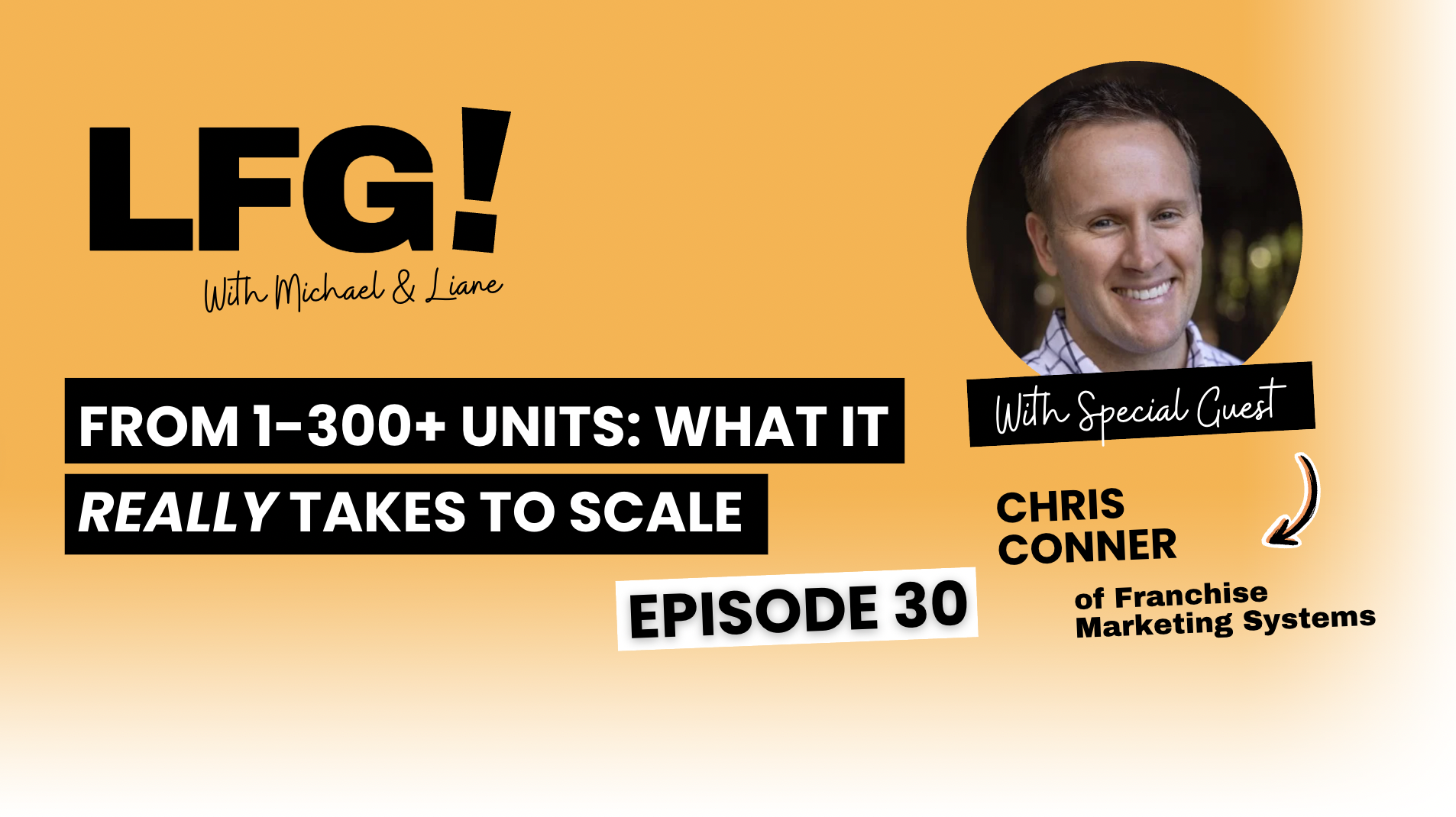E30: From 1-300 Units: How to Really Scale Your Franchise

Hosts: Michael Hyam and Liane Caruso
Guests: Chris Conner, President, Franchise Marketing Systems
In a recent episode of the franchise industry podcast, Chris Conner, founder of Franchise Marketing Systems (FMS), shared invaluable insights on how to scale your franchise, from his 25 years of experience.
Having worked with brands like Jimmy John’s, Antebellum’s European Wax Center, and Two Men and a Truck, Conner offers a unique perspective on what separates scaling success stories from those that stall out.
Podcast Summary: How to REALLY Scale Your Franchise, From Storytelling to Success
According to Conner, while there are textbook factors that contribute to franchise success—strong financials, good systems, and solid branding—the most critical element often comes down to the entrepreneur themselves.
“There’s a big part of this that I found from doing it that comes down to the entrepreneur themselves. The owner, the CEO, the leader of that company, and part of what makes these things go is that person’s commitment to scale and growth,” Conner explains.
He shares a compelling example of two restoration companies: one with just six months in business and $500,000 in annual sales that scaled to 350 locations and sold for $250 million, while another with 30 years of experience and $12 million in sales sold only one franchise before quitting.
The difference? The first owner was laser-focused on growth and quickly transitioned out of day-to-day operations to focus on scaling the system.
The Biggest Misconceptions About Franchising
Misconception #1: You Lose Control
Many business owners fear that franchising means losing control over their brand and quality standards. Conner argues this is actually backwards: “In a well-run franchise model, the franchisor has so many controls over the franchisee. The agreement is 98% in the franchisor’s favor. You can dictate everything you want to the franchisee.”
He emphasizes that franchisees often outperform company-owned locations because they have skin in the game: “The person who put their own money into it… has a vested interest, and their butt’s on the line to make this thing work.”
Misconception #2: Franchising Is Fast Money
“Franchising is not fast money,” Conner warns. Many entrepreneurs expect immediate returns, but successful franchise systems typically break even or even lose money in the first year while investing in infrastructure, marketing, and staff to support growth.
The reward comes later: while traditional businesses might sell for 2-3 times earnings, franchise systems can command 15-20 times earnings, with some clients selling for as much as 34 times earnings due to their proven, duplicatable systems.
The Foundations For How to Scale Your Franchise
Before diving into franchise development and growth, Conner recommends entrepreneurs establish several key elements:
Strategic Planning
- Validate all numbers to ensure fees and territory structures make sense
- Ensure franchisees can achieve competitive returns on investment
Operations and Training Systems
- Comprehensive operations manuals (300+ pages covering every aspect of the business)
- Modern learning management systems (LMS) with interactive, video-based content
- “Big manuals are great, but in today’s day and age… everything needs to be technology, it needs to be interactive video, easy to use”
Professional Branding
- Investment in professional design and marketing materials
- Strong social media presence and website
- “A franchisee coming into your business will scrutinize everything that you have. Probably 10x what a consumer would”
The Critical Transition: From Operator to Franchise Leader
One of the biggest challenges entrepreneurs face is transitioning from hands-on operator to franchise leader. Conner’s approach involves:
- Constant reinforcement of the long-term vision and success stories
- Gradual replacement at the corporate location, starting with 20 hours per week
- Personal development through coaching and industry connections
- Strategic hiring of operations staff at 5-10 units, and executive leadership at 50-60 units
“The first level is getting the guy to stop making pizzas every day,” Conner notes, emphasizing that this mental shift is crucial for franchise success.
The Bottom Line: Scale Your Franchise With Strategy
Successful franchising requires more than just a good business model—it demands a fundamental shift in mindset from operator to system builder.
As Conner puts it, entrepreneurs must embrace that they’re no longer in their original business; they’re in the business of growing and supporting franchisees.
For entrepreneurs considering the franchise path, the key is understanding that while the journey requires significant investment and patience, the potential rewards, both financial and in terms of impact, can be transformational. The question isn’t whether your business can be franchised, but whether you’re ready to make the mental and operational shifts necessary to build a scalable system.
Listen to the full episode now to hear more from Chris and the LFG Podcast team!